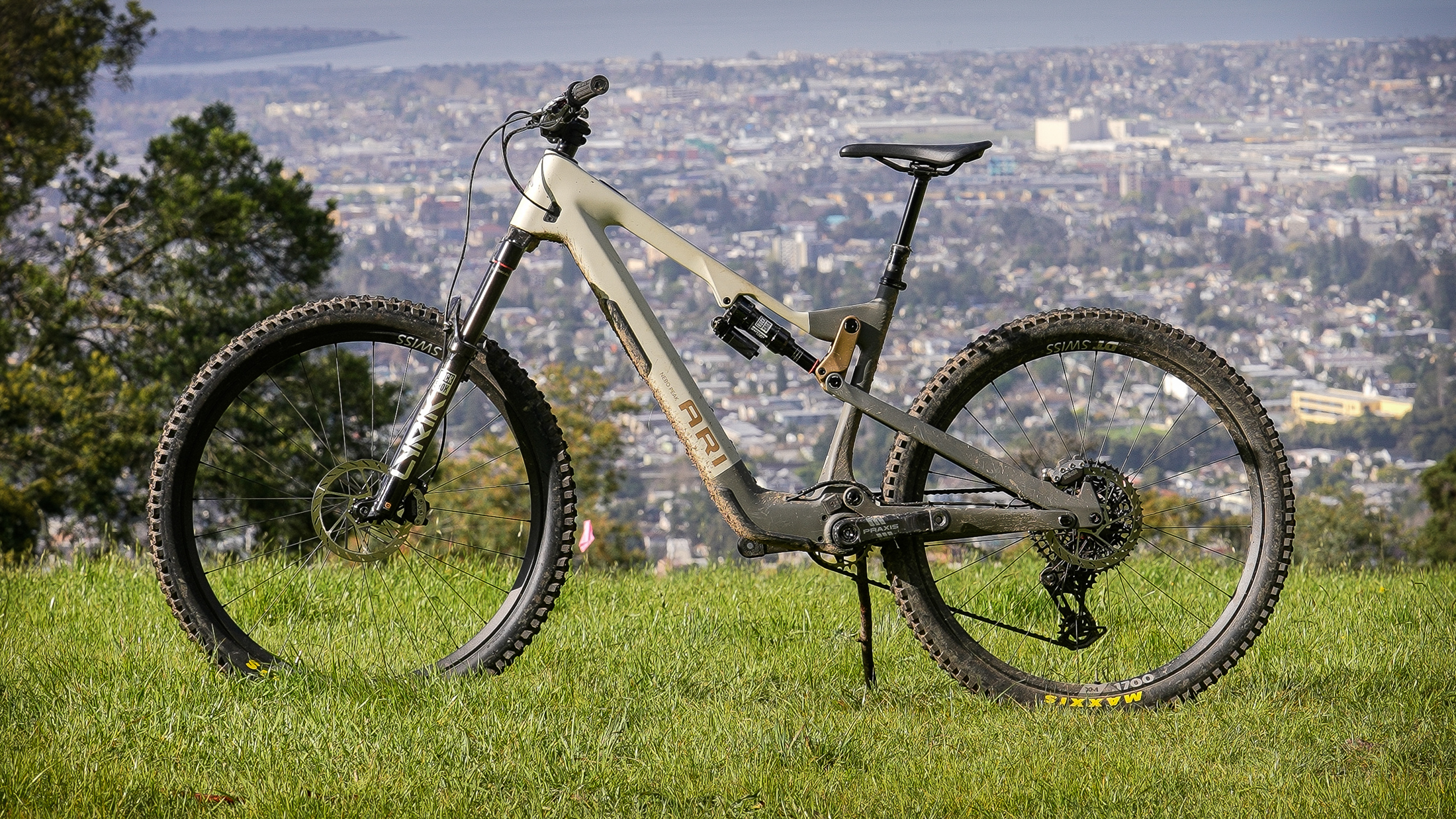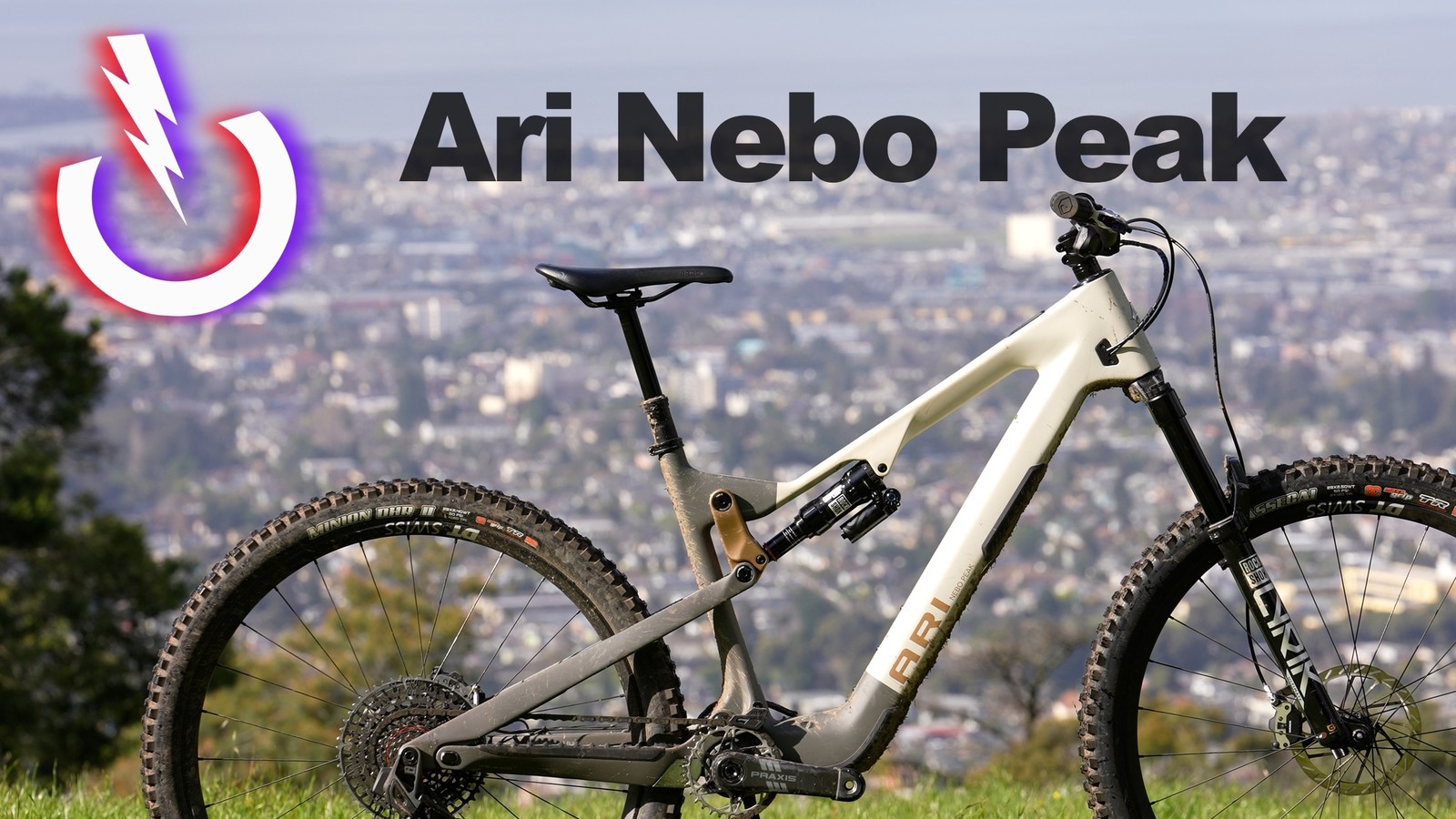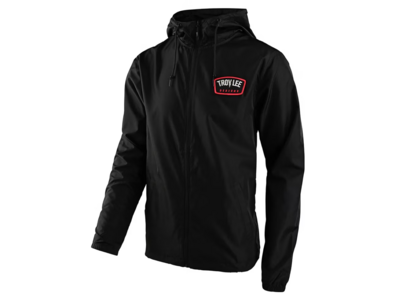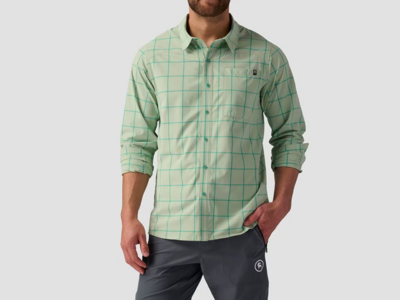The Nebo Peak is the first new model from Ari Bikes, the brand formerly known as Fezzari. It is the lightest e-bike the Utah-based company has ever made. With promising features and an attractive frame design, the Nebo Peak looks to signify the brand's refined new image.
Highlights
- Full carbon fiber frame and link
- 29-inch wheels (mixed wheel compatible)
- 140mm of rear wheel travel // 150mm fork travel
- Horst-link suspension design
- 430Wh Fazua Energy FIX (range extender available)
- 60Nm Fazua Ride60 motor
- Integrated top tube display
- Handlebar-mounted Ring controller
- Five customizable assist modes via RideControl App
- Fully guided internal cable routing
- 65-degree head tube angle
- 434.6mm chain stay length
- Four build kits
- Sizes: S-XL
- Verified weight (size XL, Pro build): 42.8 pounds (19.42 kg)
- MSRP: $6,199 - $9,999 USD ($7,999 as tested)

Prioritizing the lightweight end of the SL category, the Nebo Peak was the second-lightest bike in our test and the lightest Fazua-powered bike in the group, coming in at 42.8 pounds. Fazua's Ride 60 system offers one of the best power-to-weight ratios, delivering 60 Nm of torque and 450 watts of peak power at just 4.3 pounds. The Nebo Peak's manageable weight made for a natural feeling on the trail and helped optimize battery life with enough assistance to take the edge off even the steepest climbs.

The Ride 60 system has three assist levels, Breeze, River, and Rocket, which are selected via a handlebar-mounted Ring controller. Corresponding color-coded lights on a top-tube-mounted display indicate the current mode and display battery life. For more in-depth information, the RideControl app displays battery life as a percentage, allows personalization of each assist mode, and enables riders to create 'riding profiles' to optimize power delivery for their needs.

The Nebo Peak boasts a low 736mm standover height across most sizes, and an uninterrupted seat tube for long dropper post insertion. Geometry numbers have been kept within reason but should pair well with a wide variety of riders and terrain types. Still, the numbers reflect some great gravity-focused attributes and appropriately match the 140mm of rear wheel travel and 150mm fork. Chainstay lengths measure 434.6mm across all sizes. The head tube angle sits at 65 degrees, and the seat tube angle is at 77 degrees. A geometry flip chip located in the chainstay pivot enables mixed or full 29-inch wheels. Flipping from the "Short" setting to the "Long" setting extends chainstay length by 5mm and reduces the headtube and seat tube angles by half a degree. We tested in the "Short" or high setting for the duration of the test with no complaints.

Ari offers the Nebo Peak in four build kits ranging from $6,199 to $9,999. A frame-only kit is available for $4,999, with the option to add a RockShox Lyrik Ultimate fork for an additional $800. All build kits feature the same full carbon fiber frame with thoughtfully placed molded frame protection and fully guided internal cable routing. We tested the $7,999 Pro level build kit, making the Nebo Peak the cheapest bike in the test. Build highlights include RockShox Ultimate suspension, SRAM X0 Transmission drivetrain, MAVEN Ultimate brakes, and DT Swiss XM1700 wheels—a build that leaves little to be desired. Prices are subject to change as usual, and Ari currently has a few models on sale, so hit up their website for the most accurate pricing.
The Nebo Peak just squeaked its way into our Test Sessions after launching at the beginning of March. One of the newest additions to the SL category, its clean colorway and banging component spec had us eager to see how it would perform on trail.
Test Sessions has long been Vital's way of placing a bunch of similar bikes head-to-head to see where each excels and what sets them apart to help riders better understand which bike best suits their needs. This year, we had eight SL e-bikes, and three testers. This article just covers what we thought of Specialized's Levo SL. To learn more about the other bikes tested, check out our complete SL eMTB Test Sessions.
Meet the Testers

|
Jason's Impressions
Strengths |
Weaknesses |
|
|
What's The Bottom Line?
The Nebo Peak landed right behind the Heckler SL and Levo SL as my favorite true SL e-bike in the test. It rode like a capable 140mm travel bike, offering great composure and performance going up and down, with a little more reservation in the rowdiest sections. I had no issues hoping on the Nebo Peak and having a ton of fun dicing up the faster, flowier trails. Its weight faded into the background on descents, allowing me to pick and hit lines like I would on my regular trail bike. The suspension offered great support that kept the Nebo Peak responsive to input. I was able to find little bumps or berms to pump and generate speed, and I loved how well the bike carried speed on lower-angle trails. When climbing, the Nebo Peak placed me in a comfortably upright position that was just aggressive enough to put in a strong effort if desired. Fazua's Ride 60 offered the best power-to-weight ratio in the test. I'm not a fan of the flimsy assist controller, but the minimalistic display offers just enough info, while the motor delivers smooth, strong torque at various cadences.
The Nebo Peak presented the best value in the test with a flawless build spec at a ridiculous price. When you combine that with a tidy, clean frame design and a light, fun ride quality, the Nebo Peak is the best way to try out an SL e-bike. You get high performance at a fraction of the cost, what's not to like?
Jonny's Impressions
Strengths |
Weaknesses |
|
|
What's The Bottom Line?
The Nebo Peak was another outlier in the test as a bike from a brand none of us had ridden and it proved to be one of my favorites. The bike has fairly neutral geometry which made changing direction easy in every situation we tested it in, and a centered body position inspired confidence in the rough stuff. Just like the other Fazua bikes, the ring controller was one a downfall of this bike for the cheap feeling and sometimes difficulty switching between modes. The amount of noise the frame produces from rock strikes and chatter was notable but didn’t translate into any performance deficit. Aside from the minor drawbacks, the build kit Ari offers is hard to beat for the price, this was the cheapest bike in the test and has many similar components to the most expensive bike in the test.
Lear's Impressions
Strengths |
Weaknesses |
|
|
What's The Bottom Line?
The Nebo Peak felt like home right off the bat and came specced ready to tackle a mix of terrain. The neutral geometry put me in a comfortable climbing position and allowed for easy maneuverability while descending. When opening it up a bit more, the bottom bracket felt slightly tall, which lowered my confidence when diving into really gnarly sections. It wasn't a huge handicap, though, as the Nebo Peak was still plenty capable on the majority of test trails we rode. The rear suspension was less active over bumps while climbing but was supportive on descents, helping keep the bike planted and responsive to input. Battery performance did seem to have a slight advantage over the other Fazua-powered bikes thanks to the Nebo's low weight. Motor performance was also top-notch. The Fazua system offered the best combination of torque, consistent power, low weight, and a clean interface. Overall, the Nebo Peak feels like a tried and true all-mountain platform with great value, a solid motor and battery package, and a tidy frame design with no outstanding flaws.
View key specs, compare e-bikes, and rate the new Ari Nebo Peak in the Vital MTB Product Guide.
A big shout out to Tannus, Feedback Sports and Maxxis for supporting Test Sessions!







View replies to: Vital's SL eMTB Test Sessions - Ari Bikes Nebo Peak Review
Comments